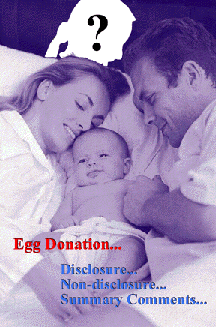|
|
|
In The Past:
I used to suggest that parents tell the child that they were the product of egg donation. This probably stemmed from my personal leaning towards full disclosure and honesty. I was concerned that the information would be found out at the most unpleasant of times, such as the child's rebellious adolescent period.
Understanding my personal bias, I still encouraged patients to do what was best for their particular situation. |

|
|
If a designated donor is used, it may be best to consider telling the child, friends and family members. This is a secret that may be very difficult to keep, especially if the egg donor is a close family member.
If one uses an anonymous donor, disclosure and nondisclosure are both viable options. I would suggest, however, that one wait to tell family and friends until after the future parents have thought out all of the aspects of disclosure. Once told, it goes without saying that it is impossible to un-tell. Over 80% of those couples who underwent sperm donation, and divulged the process to someone, wished that they had never told anyone the information ( Klock SC, et al. 1994 ).
If one does tell the child, I have suggested some of the following statement:
We wanted to have you so badly that we went through amazing steps in order to bring you here.
We worked very hard so that we could have a wonderful child like you.
I think these words emphasize the positive aspects of ART and Egg Donation while centering on the love you feel for the child. |

|
|
If one decides to not disclose, what does one say to the delivering Obstetrician? I would be cautious in providing a great deal of information that could be placed on the prenatal record. The prenatal record is seen by numerous persons including the Obstetrician's office staff as well as hospital personnel after the prenatal record is sent in preparation for your delivery. I have called the Obstetrician myself and explained the set of circumstances and asked the documentation be minimized. One of the most important concerns of the Obstetrician will be the age of the donor at the expected time of delivery. The occurrence risks of genetic diseases, such as Down's Syndrome, are directly proportional to the maternal age, in this instance, the age of the donor at the time of delivery. This information can be clearly provided to the delivering physician without imparting all of the details on the chart.
If not disclosed to family and friends, be prepared for some funny feelings at the time of delivery and for years beyond. It is absolutely amazing how many friends and family members will say how much the child looks like the mother or other maternal family members. The new parents will have to fight the guilt of feeling untruthful to these well-meaning friends and family. I see these discussions take place equally with non-disclosed donor sperm pregnancies. Keep in mind that many egg donors and sperm donors are chosen because of particular characteristics of the subfertile parent so it is not unexpected for the child to resemble the subfertile side of the equation. I simply suggest that you be prepared for the comments.
If one decides to not disclose, what does a woman say to the child's Pediatrician? This is a difficult question since I can not advocate telling an untruth. Hopefully, the egg donor will have had a negative genetic history, and any family history will truly be insignificant. If there is some important egg donation history, one alternative is to incorporate this history into the Mother's family history. While not entirely truthful, the child is best served by this combination technique. I suppose that this is a mixed truth.... |

|
|
Once again, from my perspective, the decision to disclose or not to disclose is a very personal decision. While quite debatable, my personal feeling is that the privacy rights of the parents override the rights of the child to know their genetic background.
I always try to remind my patients that being a Mom or Dad has little to do with the genetic deposition or contribution of the DNA material. Instead, being a Mom or Dad has everything to do with providing emotional, financial and loving support to a child. This support is not dependent upon the genetic contribution, but is very dependent upon the hearts and minds of the parents. |

|
Reference:
Klock SC, Jacob MC; Maier D. A prospective study of donor insemination recipients: secrecy, privacy, and disclosure. Fertil Steril 1994;62:477-84. |

|
Additional Links of Interest: |
Additional links abound on this site including the SRMS statistics and commentaries on the third party conception procedures. |
|
|

|
|






